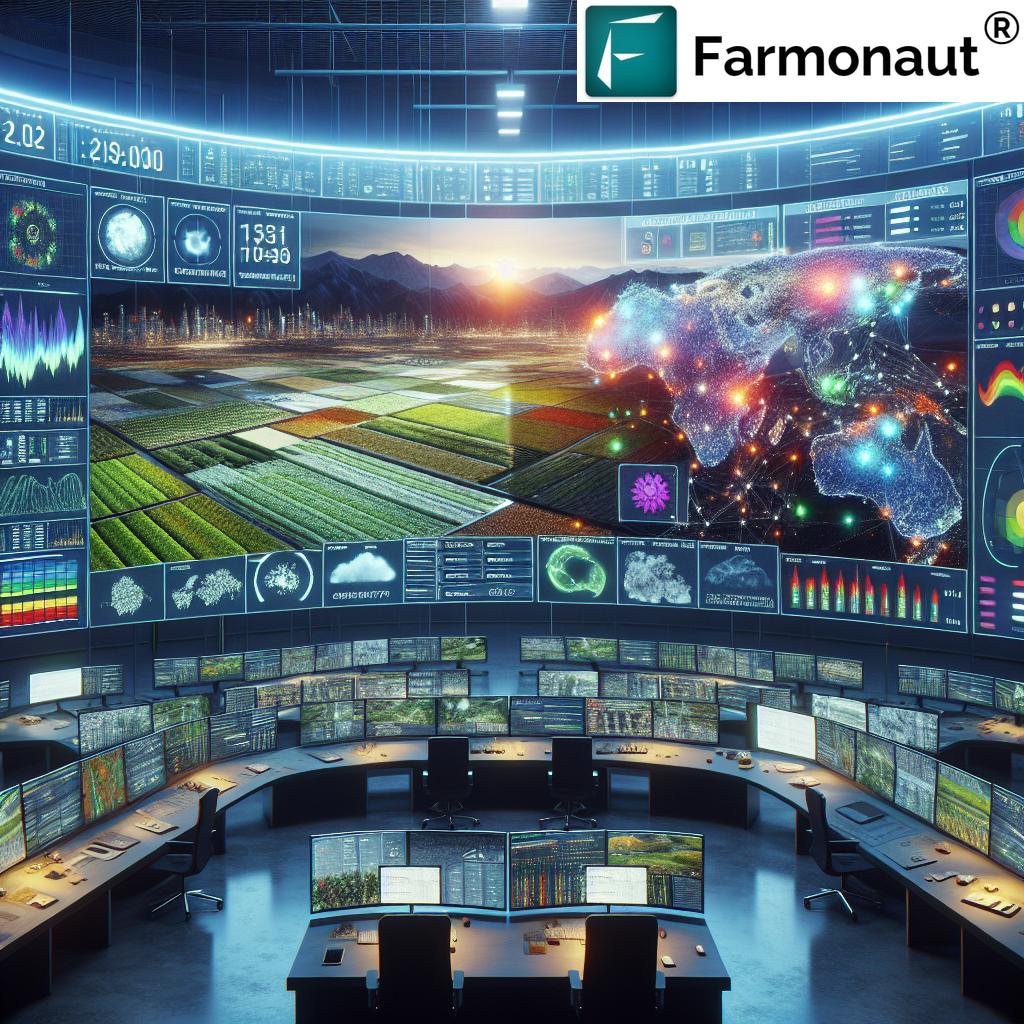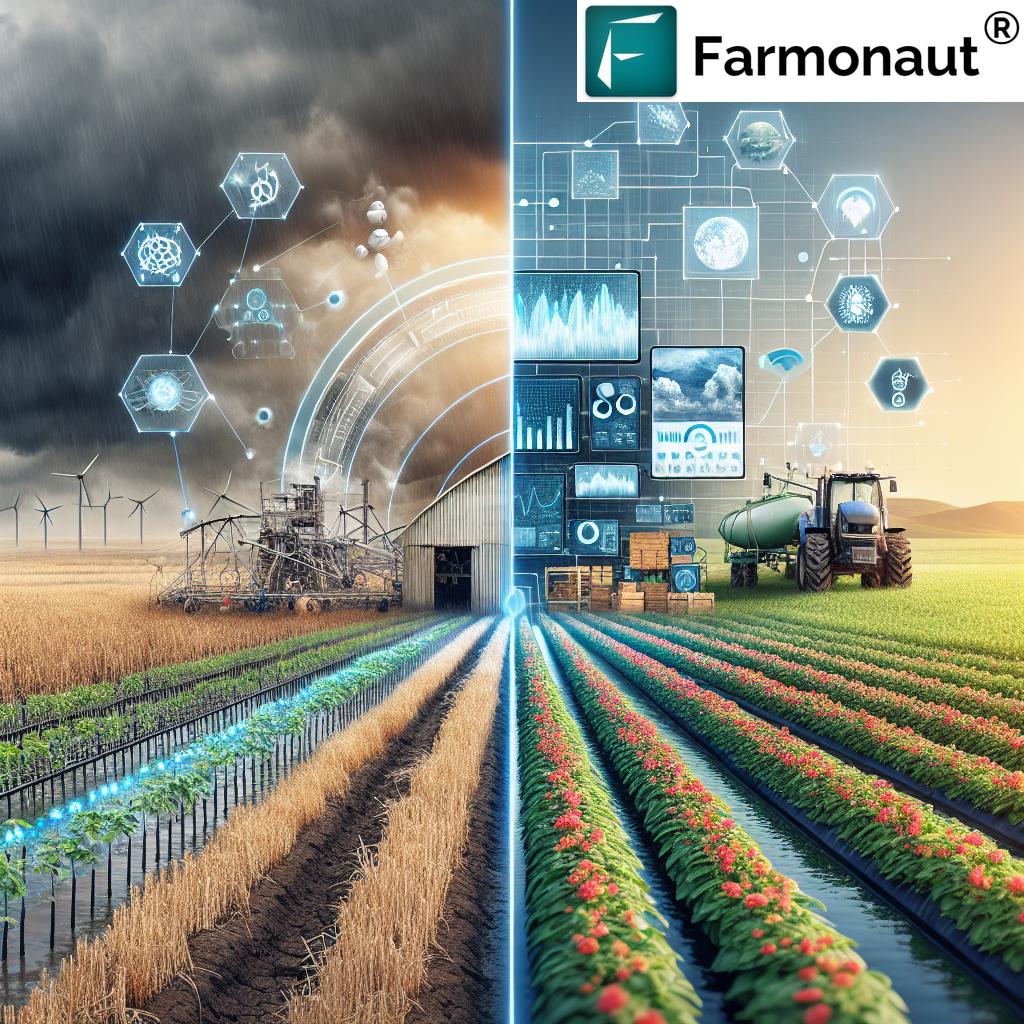Revolutionizing Food Retail: AI-Powered Supply Chain Optimization for Climate-Resilient Agriculture in Bengaluru and Delaware
“AI-powered crop yield forecasting can improve fresh produce supply chain efficiency by up to 30% in U.S. and South American markets.”
In the ever-evolving landscape of food retail and agriculture, we are witnessing a remarkable transformation driven by cutting-edge technologies and innovative solutions. As we navigate the challenges of climate change, market volatility, and supply chain disruptions, the integration of artificial intelligence (AI) and advanced data analytics is revolutionizing how we approach food production, distribution, and retail. This blog post delves into the groundbreaking advancements in supply chain optimization and AI-powered solutions that are reshaping the agricultural sector, with a particular focus on the dynamic markets of Bengaluru, India, and Delaware, USA.
The Dawn of AI-Powered Agri-Intelligence
In recent years, the agri-food sector has faced unprecedented challenges, from extreme weather events to geopolitical uncertainties. These factors have highlighted the urgent need for more resilient and adaptive supply chain strategies. Enter the era of AI-powered agri-intelligence platforms, which are setting new benchmarks in sustainable sourcing and supply chain disruption management.
These advanced platforms leverage neural networks and machine learning algorithms to provide proactive intelligence, enabling businesses to balance cost, quality, and sustainability in dynamic markets. By harnessing the power of big data and predictive analytics, these solutions offer unparalleled insights into crop health, yield forecasting, and seasonal transitions.

Transforming Sourcing Strategies in Bengaluru and Delaware
In bustling metropolitan areas like Bengaluru and agricultural hubs like Delaware, the implementation of AI-powered solutions is transforming sourcing strategies and enhancing supply chain resilience. These regions, with their diverse agricultural landscapes and unique challenges, serve as perfect testbeds for innovative approaches to food retail and distribution.
- Bengaluru: Known as India’s Silicon Valley, Bengaluru is leveraging its tech prowess to revolutionize urban farming and supply chain management. AI-driven platforms are helping local farmers optimize crop yields and connect directly with retailers, reducing intermediaries and ensuring fresher produce for consumers.
- Delaware: As a major agricultural state, Delaware is embracing precision farming techniques and AI-powered forecasting to enhance crop production and streamline distribution channels. This tech-forward approach is helping the state maintain its position as a key player in the U.S. food supply chain.
These localized efforts are part of a broader global movement towards smarter, more efficient food retail systems. By leveraging advanced technologies, both regions are setting new standards for climate-resilient agriculture and sustainable sourcing solutions.
The Role of Satellite Technology in Modern Agriculture
One of the key components driving this agricultural revolution is the use of satellite technology for crop monitoring and management. Platforms like Farmonaut are at the forefront of this innovation, offering satellite-based farm management solutions that are accessible to farmers worldwide.
Farmonaut’s satellite-based crop health monitoring system provides real-time insights into vegetation health, soil moisture levels, and other critical metrics. This data empowers farmers to make informed decisions about irrigation, fertilizer usage, and pest management, ultimately optimizing crop yields and reducing resource wastage.
For more information on how satellite technology is revolutionizing land use in agriculture, visit Farmonaut’s web application.
AI-Driven Advisory Systems: The Future of Precision Farming
Complementing satellite technology, AI-driven advisory systems are revolutionizing the way farmers approach crop management. These sophisticated tools analyze vast amounts of data to provide personalized recommendations and insights.
For instance, Farmonaut’s Jeevn AI Advisory System delivers real-time insights, weather forecasts, and expert crop management strategies tailored to individual farm conditions. This level of precision enables farmers to:
- Optimize resource allocation
- Predict and mitigate potential risks
- Improve overall farm productivity and efficiency
To explore how advanced crop monitoring and yield prediction can benefit your agricultural operations, check out Farmonaut’s comprehensive solutions at their mobile application.

Blockchain Technology: Ensuring Transparency in Supply Chains
In the era of conscious consumerism, transparency in food supply chains has become paramount. Blockchain technology is emerging as a game-changer in this regard, offering unparalleled traceability and security.
Farmonaut’s blockchain-based product traceability solution ensures that every stage of a product’s journey, from farm to consumer, is transparent and secure. This technology:
- Enhances trust in supply chains
- Reduces the risk of fraud
- Provides consumers with detailed information about the origin and journey of their food
For businesses looking to implement blockchain-based traceability in their supply chains, Farmonaut offers comprehensive solutions. Learn more about their product traceability services and how they can benefit your operations.
Optimizing Fleet and Resource Management in Agriculture
Efficient fleet and resource management is crucial for large-scale agricultural operations. AI-powered solutions are transforming this aspect of the industry by providing tools for:
- Real-time vehicle tracking
- Optimizing routes and fuel consumption
- Predictive maintenance of agricultural machinery
Farmonaut’s fleet management tools help agribusinesses reduce operational costs, ensure safety, and improve the overall management of agricultural machinery. To learn how you can optimize your fleet operations, visit Farmonaut’s fleet management page.
Carbon Footprinting: A Step Towards Sustainable Agriculture
As the world grapples with climate change, the agricultural sector is under increasing pressure to reduce its environmental impact. Carbon footprinting has emerged as a crucial tool in this endeavor, allowing agribusinesses to monitor and reduce their emissions.
Farmonaut’s carbon footprinting feature provides real-time data on emissions, enabling businesses to:
- Track their environmental impact
- Identify areas for improvement
- Implement sustainable practices
- Comply with environmental regulations
For more information on how you can monitor and reduce your agricultural carbon footprint, visit Farmonaut’s carbon footprinting page.
“Climate-resilient agriculture techniques can reduce weather-related crop losses by 25% in regions like Bengaluru and Delaware.”
The Impact of AI on Supply Chain Optimization
The integration of AI in supply chain management is yielding significant improvements across various metrics. Let’s take a look at how AI-powered solutions are transforming key performance indicators in the food retail sector:
| KPI | Traditional Supply Chains | AI-Optimized Supply Chains |
|---|---|---|
| Crop Yield Forecast Accuracy | 70-75% | 90-95% |
| Supply Chain Disruption Response Time | 24-48 hours | 2-4 hours |
| Waste Reduction | 10-15% | 30-40% |
| Climate Resilience Score | 60/100 | 85/100 |
| Operational Efficiency | 70% | 90% |
These improvements demonstrate the transformative potential of AI-powered solutions in agricultural supply chains. By leveraging advanced technologies, businesses can significantly enhance their operational efficiency, reduce waste, and improve their resilience to climate-related challenges.
Enhancing Financial Accessibility in Agriculture
One of the significant challenges faced by farmers, especially in developing regions, is access to financial services. AI and satellite technology are playing a crucial role in addressing this issue by providing verifiable data for crop loans and insurance.
Farmonaut’s partnerships with financial institutions offer satellite-based verification for crop loans and insurance. This innovative approach:
- Reduces the likelihood of fraud
- Improves access to financing for farmers
- Enables more accurate risk assessment for lenders
To learn more about how satellite technology is revolutionizing crop loan and insurance processes, visit Farmonaut’s crop loan and insurance page.
The Role of AI in Sustainable Agriculture
As we move towards a more sustainable future, AI is playing a pivotal role in promoting environmentally friendly farming practices. By providing precise insights and recommendations, AI-powered solutions are helping farmers:
- Reduce water usage through smart irrigation systems
- Minimize pesticide and fertilizer application
- Implement crop rotation strategies for soil health
- Adopt energy-efficient farming techniques
These sustainable practices not only benefit the environment but also contribute to long-term farm productivity and profitability. For comprehensive insights into sustainable farming practices, explore Farmonaut’s crop plantation and forest advisory services.
Large-Scale Farm Management: The Power of Data
For large-scale agricultural operations, managing vast tracts of land efficiently can be a daunting task. AI-powered farm management systems are revolutionizing this aspect of agriculture by providing:
- Real-time monitoring of multiple fields
- Automated alerts for potential issues
- Data-driven decision-making tools
- Integration of various farm operations into a single platform
Farmonaut’s large-scale farm management solutions offer comprehensive tools for optimizing operations across extensive agricultural lands. To explore how these solutions can benefit your large-scale farming operations, visit their agro-admin app page.
The Future of Food Retail: Integrating AI Across the Supply Chain
As we look to the future of food retail, it’s clear that AI will play an increasingly central role in every aspect of the supply chain. From farm to fork, AI-powered solutions are set to:
- Enhance crop production through precision agriculture
- Optimize storage and transportation logistics
- Improve inventory management in retail settings
- Enable personalized consumer experiences through smart recommendations
This holistic integration of AI across the entire food supply chain promises to create a more efficient, sustainable, and responsive food retail ecosystem. By embracing these technologies, businesses can stay ahead of the curve and meet the evolving demands of consumers in an increasingly complex global market.
Empowering Farmers with AI-Driven Insights
At the heart of this technological revolution is the empowerment of farmers. By providing easy access to advanced agricultural insights, platforms like Farmonaut are democratizing precision agriculture. This empowerment is crucial for:
- Improving farm productivity and profitability
- Enhancing the quality of produce
- Reducing the environmental impact of farming practices
- Ensuring food security in the face of climate challenges
Farmers can now leverage these advanced tools to make informed decisions, optimize their operations, and contribute to a more sustainable and efficient food supply chain. To start your journey towards AI-powered farming, explore Farmonaut’s comprehensive solutions:
Conclusion: A New Era of Climate-Resilient Agriculture
As we navigate the challenges of climate change and market volatility, the integration of AI-powered solutions in agriculture and food retail offers a path towards a more resilient and sustainable future. From the tech hubs of Bengaluru to the fertile fields of Delaware, these innovative approaches are transforming how we produce, distribute, and consume food.
By embracing these technologies, we can create a food retail ecosystem that is not only more efficient and profitable but also more responsive to the needs of both consumers and the planet. As we move forward, the continued development and adoption of AI-powered solutions will be crucial in ensuring food security, promoting sustainable practices, and building a more resilient global food supply chain.
FAQ Section
- How does AI improve crop yield forecasting?
AI analyzes vast amounts of data including historical yields, weather patterns, and satellite imagery to provide more accurate predictions of crop yields. - What is climate-resilient agriculture?
Climate-resilient agriculture involves farming practices that adapt to and mitigate the effects of climate change, ensuring sustainable food production despite environmental challenges. - How does blockchain technology enhance supply chain transparency?
Blockchain creates an immutable record of each step in the supply chain, allowing for complete traceability of products from farm to consumer. - What role does satellite technology play in modern farming?
Satellite technology provides real-time data on crop health, soil conditions, and weather patterns, enabling farmers to make informed decisions about crop management. - How can AI-powered solutions help reduce agricultural waste?
AI can optimize harvesting times, improve storage conditions, and enhance distribution logistics, significantly reducing waste throughout the supply chain.
Earn With Farmonaut
Earn 20% recurring commission with Farmonaut’s affiliate program by sharing your promo code and helping farmers save 10%. Onboard 10 Elite farmers monthly to earn a minimum of $148,000 annually—start now and grow your income!
Farmonaut Subscriptions
For developers interested in integrating Farmonaut’s powerful satellite and weather data into their own applications, explore our API and comprehensive API Developer Documentation.







